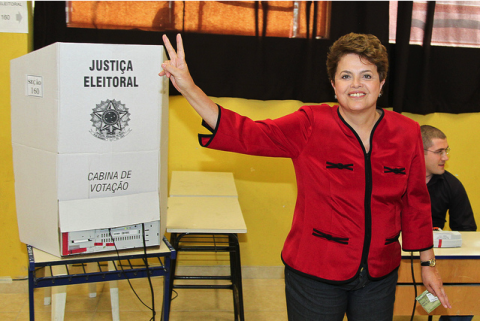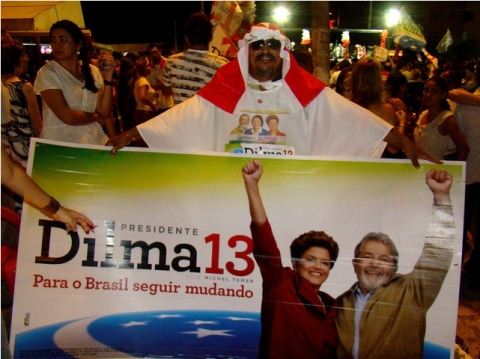
Candidate Dilma Rousseff casts her ballot in Brazil’s presidential election. (Photo by Rede Brasil Atual)

Rouseff was elected to become Brazil’s first female president on Sunday, October 31. (Photo by Isaac Ribeiro)
The election of Brazil’s first woman president should be hailed, but has not aroused many celebrations. A dirty campaign in which the media has a lot to answer for has much to do with that.
This Sunday, for the first time in its history, Brazil elected a woman to the country’s highest political office. Even for those with differing political views, this should have been hailed as an historic milestone in a nation with a male-dominated workforce. And yet, many people, weary of an incredibly negative, shallow campaign season, were just eager for it all to end.
Sadly, the media had an opportunity to hold candidates on all sides accountable. Instead, they got swept up in a wave of scandal and corruption that did little to help voters make a substantive choice.

Candidate Dilma Rousseff casts her ballot in Brazil’s presidential election. (Photo by Rede Brasil Atual)
Many believe that outgoing President Luiz Inácio Lula da Silva, with an overwhelming popularity rate of around 80%, expected to easily elect his hand-picked successor and former chief of staff, Dilma Rousseff. But during an interview in the early stages of the campaign, Ms. Rousseff said she favored de-criminalization of abortion, which is illegal in Brazil, but widely practiced in back-door clinics.
Evangelical voters and conservative Catholics were soon up in arms against Rousseff, and punished her by voting for a third party candidate, an evangelical. Others shifted to her main rival, José Serra. As if she had merely misspoke, Rousseff retreated and claimed to be against abortion. Mr. Serra exploited the U-turn on several occasions.
Suddenly, the two leading presidential contenders started acting as if they were running for pope rather than for president. They were seen in churches and in prayers with Catholics and Protestants, doing the sign of the cross and kneeling. Little wonder that the pope himself got involved, recommending that Catholic bishops advise voters to opt for candidates whose views on abortion were similar to the ones defended by the Vatican.

Candidate Dilma Rousseff casts her ballot in Brazil’s presidential election. (Photo by Rede Brasil Atual)
* When bloggers began circulating a story that Mr. Serra’s wife had confessed to having had an abortion herself years ago, when exiled in Chile, only one mainstream publication chose to address the issue and interviewed some of the former students who claimed to have heard Mrs. Serra's confession.
* When Ms. Rousseff raised a scandal about a former aide of Mr. Serra accused of arranging a public bribe and stealing from Serra's campaign, the story didn't make as many headlines.
Then, there was the most ridiculous incident of the entire campaign.
During a political rally in Rio, activists of Mr. Serra and of his party, the PSDB, faced a crowd of PT demonstrators. During the push and shove that followed, someone threw a paper ball onto Mr. Serra's head. He later claimed to have had a second object thrown against his head. And Jornal Nacional, TV Globo's leading nightly news program, devoted no less than seven minutes of the program to prove that in fact there had been a second object thrown. But bloggers experienced in editing techniques were quick to refute Globo's version in a frame-by-frame commented edition, which became popular on the Internet.
By the time voting day rolled around, abortion, a myriad of scandals and a paper ball took center stage, but calls for tax reform and improvement in our health and education system were sidelined. That is why, when the campaign finally came to end it was not with excitement for many of us, but rather with relief.
One thing is sure; Mr. Serra is not the sole loser of this campaign. Most of the country's mainstream media seriously tarnished its credibility by siding with one candidate and by trying to brush under the carpet any of his possible flaws.